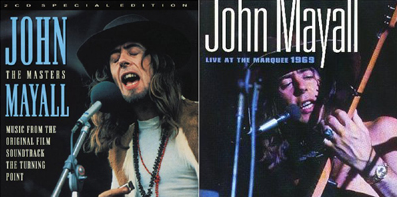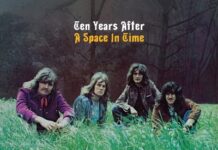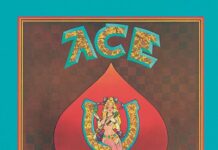Funny thing, art. Few doubt its significance, and most agree that artistic
expression in all of its forms is something to encourage and celebrate. Especially
when said artistic expression is laden with historical significance. But some
art is just… art: a specimen to be examined, recognized, boxed and mothballed.
Take, for instance, John Mayall’s, The Masters: Music from the
Original Film Soundtrack The Turning Point. Consider it art for art’s
sake, if you will; art to accompany an edgy documentary – The Turning
Point – that was recorded the same year, released in 1970 and recently
pulled from the mothballs and re-released on two compact discs.
This collection covers what was, at the time, a new band, a new sound, and
a new direction for the seminal blues artist. Recorded in 1969 shortly after
the departure of guitarist Mick Taylor — the third great blues guitarist
to jump the Bluesbreakers’ ship in as many years — Mayall stripped
his entire operation down, kicked out his drummer, and gave up on the lead-guitar
driven fury that had defined his sound; had defined “British Blues”
as well. Instead he invited saxophonist and flutist John Almond into the group,
and practically went acoustic, employing bassist Steve Thompson and acoustic
guitarist Jon Mark.
The first disc highlights the new band’s musical efforts in a collection
of live recordings that were committed to tape during three separate shows in
June of 1969. While the quality of these recordings is acceptable (unlike the
companion recording, Live At The Marquee 1969, but more on
that later) the songs are often plaintive, somewhat pretentious, and lacking
the spark of his earlier work. The audience provides a polite, almost scholarly
background to the whole affair as Mayall matter-of-factly introduces numbers
such as “Sleeping by Her Side,” “Saw Mill Gulch Road,”
and “Can’t Sleep This Night.” As a matter of semantics, this
music might qualify as blues, but it is hardly captivating. With the exception
of a typically light-on-its-feet “Room to Move,” the whole affair
quickly becomes background noise to the less than dedicated listener.
Disc two is a collection of illuminating, if somewhat sparse, interviews with
the bandleader, along with a few recorded rehearsals and outtakes. For true
fans, this is the good stuff. In conjunction with the film, it provides an insider’s
view of the band’s creative process and Mayall’s style, a topic
of considerable interest for 60s blues fans.
Overall, the collection captures an artist in a period of transition, both
personally and artistically. In addition to charting a new musical course, Mayall
would uproot and move to Laurel Canyon, the cultural hotspot of Los Angeles.
At the same time, as the interviews on disc two illustrate, his hard-line approach
to band leadership may have been softening a bit as well.
All of this creates a collection that captures this incarnation of the band
at its best, be that as it may; a historical snapshot of a great artist and
bandleader. But, unfortunately for the less than die-hard John Mayall fan, it
doesn’t offer much more. It’s art. It’s important, but not
entirely satisfying. Back to the box and mothballs with this one. Funny thing…
Frankly, as a companion piece to The Masters, the seven-song
Live At The Marquee 1969 doesn’t offer much. Yes, it
was recorded at the legendary Marquee Club in London. Yes, it features one of
England’s greatest bluesmen. Yes, it “explores seldom-used areas
within the framework of low volume music,” to quote the liner notes.
Know what else it does? It sounds horrible. Maybe those “seldom-used
areas within the framework of low volume music” are seldom used for a
reason. Seldom used because they’re boring or – worse – downright
frustrating to listen to. Whatever the case, these seven tracks have two significantly
unfortunate factors working against them: First, the band lacked oxygen, much
less creative fire, on stage that night; and second, the sound quality is only
marginally on par with some of the lesser bootlegs with which I’ve had
the displeasure of fouling my eardrums. Maybe they were all stoned: the band,
the soundman, the bovine community that tried to pass itself as an audience,
all pie-eyed and cheese-brained.
The sound mix is so uneven, in fact, that the second track, “So Hard
To Share,” sounds like eight minutes of saxophone practice. Feedback abounds
on several tracks. “The Laws Must Change” features over six minutes
of harmonica huffing and puffing. In all, four of the corpulent tracks on this
CD weigh in at more than eight minutes. The success of Mayall’s percussion-less
format is a subject for debate, even at its best, but on a night when the band
was off and the soundman was nowhere to be found, things sound, well…
ugly.
To think that the world is currently starving for oil and Eagle Records had
the audacity to waste precious petroleum producing a run of these things. John
Mayall may well have been the king of British Blues in 1969, but even the king
must empty his bowels occasionally. Unfortunately, there was a reel-to-reel
present for this bout. If you’re a Mayall fan who has to have everything
he’s ever recorded, feel free to waste your money. Otherwise, settle for
The Masters and be done with it.
~ Andrew Todd




















